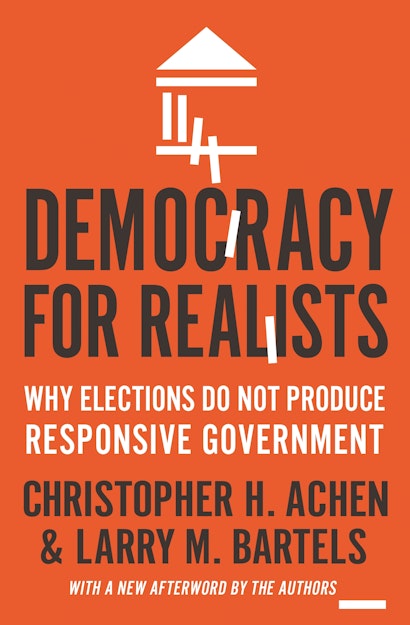"For decades, political scientists have blasted away at electoral models based primarily on the idea of rational choice. In the most recent and sophisticated entry in the field, Democracy for Realists, Christopher Achen and Larry Bartels argue that even well-informed and politically engaged voters mostly choose candidates based on their social identities and partisan loyalties. Judging from the 2016 polls, that theory looks pretty good."—E. J. Dionne, Washington Post
"In an important recent book, Democracy for Realists, Christopher Achen and Larry Bartels show that ‘group attachments' and ‘social identities' are key to understanding voting behavior."—Fareed Zakaria , Washington Post
"It flies in the face of decades of political science conventional wisdom about ‘the rational voter' and other such dicta, but it seems to me obviously true, particularly in our age."—Michael Tomasky, New York Review of Books
"[A] provocative book."—Edward Luce, Financial Times
"Democracy for Realists, by Christopher Achen and Larry Bartels, shows that however cynical you are about the democratic process, it's worse than you think. All the flaws in cognition that psychologists have been teaching for decades make a mockery of the folk theory that democracy produces responsive governments."—Steven Pinker, Harvard Crimson
"The most influential recent book on voting."—John Prideaux, The Economist
"One of the most bracing books of political science to arrive in a long time. . . . An impressively comprehensive statement on the limits of electoral democracy, a book that can both explain the emergence of Trump and potentially charts a new course for the field."—Lee Drutman, Chronicle of Higher Education
"It will confirm much that you may already have intuited—issues do not much matter—and it may make you want to jump out of a window, if you didn't already."—Kevin Williamson, National Review
"The folk theory of American democracy is that citizens deliberate on the issues and choose a candidate. That is false. The truth, as political scientists Christopher Achen and Larry Bartels describe in Democracy for Realists: Why Elections Do Not Produce Responsive Government, is that voters are tribalistic."—Jamelle Bouie, Slate
"Democracy for Realists, which [I've] become a bit obsessed with . . . Is the political science equivalent of being told Santa doesn’t exist."—Ezra Klein, Vox
"A comprehensive analysis that lays the foundation for a discussion of necessary reforms and how they can be achieved."—Kirkus
"Their writing is clear, concise, and appropriately whimsical on occasion. Certain to become a classic."—Choice
"Democracy for Realists is essential reading for anyone interested in the problem of voter ignorance, and the future of democracy more generally. It illuminates a dangerous problem that may well bedevil democracy for a long time to come."—Ilya Somin, History News Network
"Provocative, persuasive and unsettling, Democracy for Realists is a profoundly important—and timely—book."—Glenn Altschuler, Tulsa World
"The most comprehensive recent study of the American voter."—Neal Miner, Honolulu Civil Beat
"According to some conventional accounts of democracy, these systems work. Voters toss out incumbents in hard times and retain them in good times. . . . The genius of Achen and Bartels' work—the depressing genius of it—is the breadth of evidence they marshal that this is simply not the case."—Peter Loewen, Ottawa Citizen
"The book might make dreary reading about the failings of democracy. But by applying what Achen and Bartels say to what is happening in the elections. . . . It is possible to make some sense."—Han Fook Kwang, Singapore Straits Times
"The 2016 election cycle has confounded a good deal of scholarship and punditry so far. But one book that's coming out smelling like a rose is Christopher Achen and Larry Bartels' new book Democracy for Realists: Why Elections Do Not Produce Responsive Government. This book's novel argument is that we've been thinking about democracy all wrong."—Seth Masket, Pacific Standard
"Democracy for Realists is essential reading for 2016, an empirically and theoretically rigorous political science treatise that debunks traditional defenses of democracy as a way to reflect the ‘will of the people' or allow well-informed and rational voters to guide the country. In their place, Christopher Achen and Larry Bartels advance a theory of democracy grounded in group identities and social psychology."—Jason Furman, Bloomberg
"The myth of the informed democratic voter is itself an example of long-ingrained, stubborn anti-knowledge. In their brilliant new Democracy for Realists, the political scientists Christopher H. Achen and Larry M. Bartels explain that laypeople and experts alike have developed a ‘folk theory' holding that American democracy is built on an engaged electorate that casts its votes for rational policy reasons. Unfortunately, as Achen and Bartels demonstrate, decades of research have shredded this theory, stomped on it, and set the remains on fire."—Noah Berlatsky, Reason
"One of last year's most-celebrated works of political science."—Eric Levitz, New York Magazine Daily Intelligencer
"In Democracy for Realists, Achen and Bartels explain that deep-seated social identities and group affiliations motivate political action far more than individual rationality does. They convincingly debunk what they term the ‘folk theory' of electoral democracy, an idealized view in which informed voters assess candidates on the basis of their own policy preferences or ideology and the leaders they elect then respond to the wishes of the majority, producing public policies that meet voters’ demands. Drawing on a vast literature, Achen and Bartels argue that, in fact, most people are uninterested in politics and poorly informed about issues."—Suzanne Mettler, Foreign Affairs
"[Achen and Bartels] argue, contrary to the standard folk theory, that individuals are group-minded partisan members, and their reasons for voting in certain ways are based mainly on ideological or partisan grounds. Thus, group identity has more of an impact on electoral choice than policy. . . . [A] welcome addition to the literature on democratic theory and electoral politics."—Spiro Metaxas, Political Studies Review
"[Achen and Bartels] do an especially fine job with their analyses of retrospective voting and identity politics, making a noteworthy contribution to the theory of voting behavior, and their book would be a good choice for undergraduate or graduate courses as an introduction to the political science literature on voting behavior."—Tim Cox, Independent Review
"Democracy for Realists is densely packed with supportive examples and statistics. It is well written with a persistently scholarly tone and far more nuance than can be portrayed here."—Robert Erikson, Political Science Quarterly
"[The authors] argue against the ‘folk view of democracy: that we are all these rational, NPR-listening voters that have opinions about policy issues and will vote for representatives that best reflect our policy preferences.’ Their research suggests that we instead pick a political party — a team — and support whatever policies our team advocates for."—Francis Fukuyama, Vox
"An important book. The authors basically destroy our most cherished ideas about democracy."—Helio Schwartsman, Folha De S. Paolo
"Two of America's smartest political scientists bid fair to transform our understanding of democracy. In our season of democratic discontent, this unsettling book could hardly be more timely. Must-reading for anyone interested in democratic theory and American politics."—Robert D. Putnam, author of Bowling Alone: The Collapse and Revival of American Community and Our Kids: The American Dream in Crisis
"Democracy for Realists is the single most important treatise on American democracy published in several decades. Achen and Bartels challenge just about every existing school of thought about electoral politics, policymaking, and government performance. They do not conclude with a counsel of despair for the future of American democracy, but they give no quarter to any notion that responsive government is possible without a more responsible citizenry."—John DiIulio, University of Pennsylvania
"It is impossible to overstate the significance of this magnum opus on democracy and democratic theory. Achen and Bartels lay waste to the folk theory of democracy through dazzling logic and rigorous empirical analysis. Democracy for Realists will become an instant classic, shaping our thinking on democracy for decades to come."—Thomas E. Mann, Brookings Institution and the University of California, Berkeley
"It is common in the history of science for scholars to bark up the wrong trees. Achen and Bartels make a strong case that spatial models of mass elections and the theory of retrospective voting are examples of wrong trees. Scholars, they argue, should now reorient toward group attachments as the foundation of democratic politics. All in all, this is a broad, deeply thoughtful, and courageous book."—John Zaller, University of California, Los Angeles
"Not since the work of Walter Lippmann, David Truman, Philip Converse, and Robert Dahl have empirical democratic theorists made us think so deeply. Achen and Bartels demolish the folk theory of democracy in which politicians obtain mandates from rational voters. Instead, they propose an exciting new agenda that wrestles with the real democratic process in which political parties and interest groups fashion public policies to appeal to people's basic identities."—Henry E. Brady, coauthor of The Unheavenly Chorus: Unequal Political Voice and the Broken Promise of American Democracy
"The best book to understand the 2016 campaign."—Matthew Yglesias
"The most clear-eyed take on American democracy I have read in a long time."—Daniel W. Drezner, Tufts University
"Democracy for Realists has the potential to become a classic. It raises questions that every democratic theorist and practitioner should take seriously. It is certain to provoke significant discussion."—Jane Mansbridge, Harvard University
"Democracy for Realists is a terrific book. It takes on big questions, is brimming with smart analysis and crisp argumentation, and the writing is elegant. There is pleasure and provocation on nearly every page. Achen and Bartels have made a major contribution to modern social science."—Donald R. Kinder, coauthor of The End of Race? Obama, 2008, and Racial Politics in America


